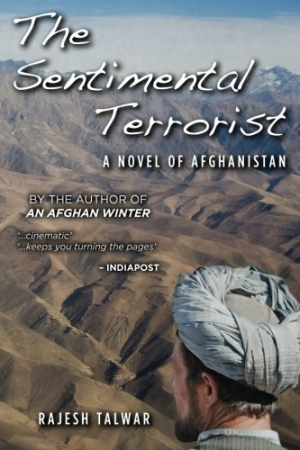The Sentimental Terrorist
A Novel of Afghanistan
“Now I see Nine/Elevens being inflicted on my own country,” laments Mohsin Khan, the educated, thoughtful Afghan protagonist for whom Rajesh Talwar named his magnificent and powerful thriller, The Sentimental Terrorist. This is not merely a novel told from the terrorist’s point of view; it explains why and shows how the pain of lost relatives and the need for revenge can push a good, honest, loving, and intelligent man into becoming a human weapon.
Talwar worked for many years in Afghanistan. This is his second novel set in that country. It is evident from the first page to the last that he understands its culture, its people, and what is driving so many into the arms of a violent Taliban insurgency they once and often still despise. “I don’t believe in killing innocents,” explains Khan, even though it is his family members, like so many others, that are killed by American planes that are “bombing innocent civilians all over Afghanistan.” For that, he says to the reader, “no one could forgive them.”
The Sentimental Terrorist is set the night before an actual terror attack in a guest house for foreign aid workers in Kabul, in September 2009. Talwar watched that attack unfold from a house across the street, and he lost several friends and colleagues that day. Although this is a work of fiction, it reads like three primary source diaries shuffled together into a first-person account of a historical event.
Mohsin Khan is one of three major characters whose stories are told and intertwined by Talwar. The others are Amala, a Bangladeshi relief worker assigned to set up loan programs for Afghan farmers, and James, a former British soldier and self-admitted “war-junkie” working in Kabul as a consultant on security and strategic affairs. These three are also involved in a pair of love triangles connecting a paunchy, middle-aged French doctor, his stunning yet deeply troubled Afghan female translator, and a raucous American mercenary helicopter pilot. The last of these is very much a stereotype of the “ugly American” and is every bit as one-dimensional a character as Mohsin Khan’s terror recruiter, Mullah Shamsuddin. Although cardboard cutouts, they perform vital roles as touchstones for the story.
That story is not just about terrorism and war; it is also about love—or three love stories, to be more accurate. Mohsin Khan’s confession to the reader of his love for the translator, Mumtaz, is poignant and touching, as is Mumtaz’s heartache at having to sacrifice her own happiness in order to save her mother from her brutal stepfather. Amala and James also have strong and believable feelings for one another—and like Mumtaz, Amala must also forego love if she is to remain a dutiful daughter to her family. All four are star-crossed lovers, and while Kabul may not be Verona, Talwar’s tale is Shakespearean at its heart.
Although it is in many ways timeless, The Sentimental Terrorist is also a very contemporary tale. It is a story of war and corruption, of badly managed military and political campaigns, of indiscriminate bombings, and of the abuse of religion to lure young men into becoming suicidal killers. “We are a vengeful lot,” remarks Mohsin Khan, and in a country where “every family has a victim,” it is a sad but understandable fact that so many “will do anything to avenge” such a loss.
This is a powerful book, and one that will satisfy even the most seasoned observer of Afghanistan’s compelling role in world affairs.
Reviewed by
Mark McLaughlin
Disclosure: This article is not an endorsement, but a review. The publisher of this book provided free copies of the book and paid a small fee to have their book reviewed by a professional reviewer. Foreword Reviews and Clarion Reviews make no guarantee that the publisher will receive a positive review. Foreword Magazine, Inc. is disclosing this in accordance with the Federal Trade Commission’s 16 CFR, Part 255.

